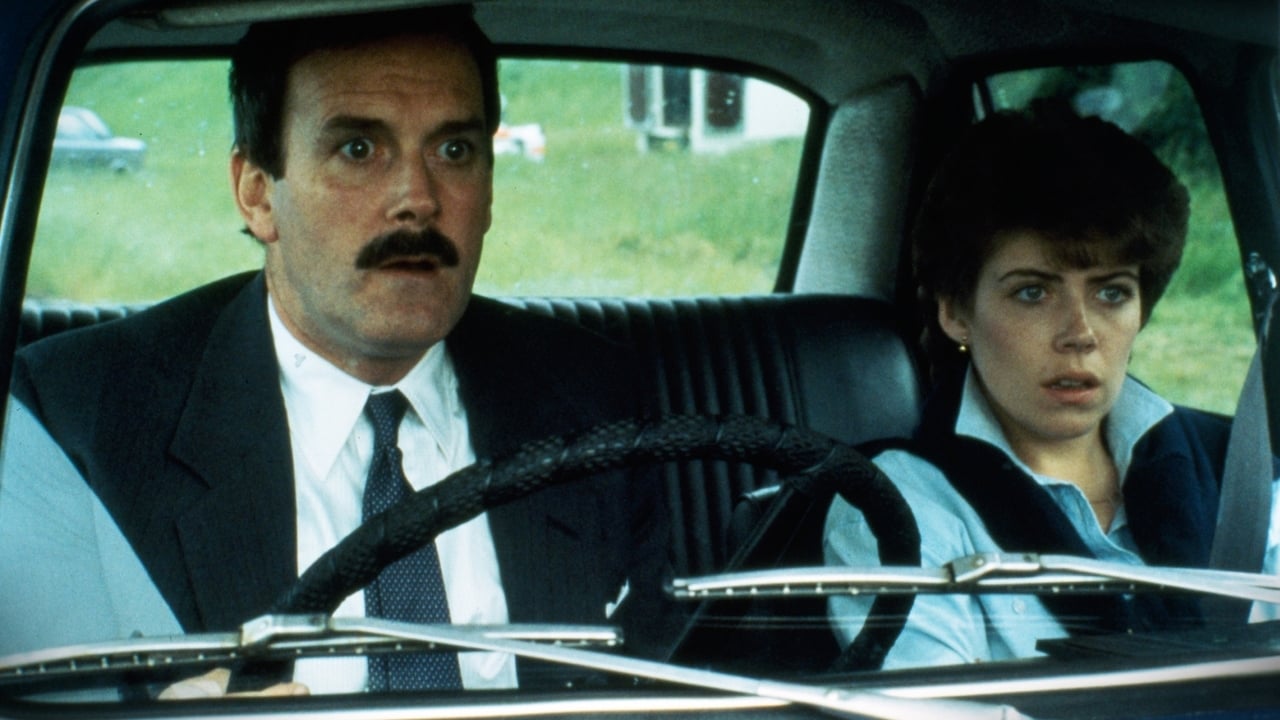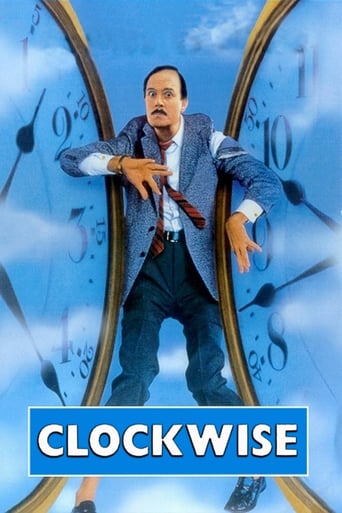

This is a much funnier film than A Fish Called Wanda. A relatively simple concept, left versus right, winds up into a clock spring of comedy. The final scene brings together all the threads of all the characters and scenes visited en route, in a similar style as that of the traditional British farces (e.g. The Wrong Box) There are so many wonderful characters that to list them would be to take away from the experience of watching them and rolling about the floor in laughter, but I have to say that the old ladies on their outing from the Home are some of the funniest in the entire wonderful film. If there had ever been any doubt in anyone's mind that John Cleese was capable of sustaining an entire comedy movie without aid from the other members of Monty Python's Flying Circus, "Clockwise" should have convinced them. Not to be missed.
... View MoreBefore I start I just want to say that I'm a *massive* fan of Cleese and virtually all of his work, from his acting performances to his work behind the camera. I'm very fond of so much of his filmography, from the Python series and films, to A Fish Called Wanda to Fierce Creatures and of course, the near perfect Fawlty Towers.Because of this, I was recommended Clockwise.I was expecting a feature-length symphony of chaos and Cleese-humour; Fawlty Towers, but given a budget and a 100 minute run time to wreak havoc for Cleese's character.However, Clockwise is anything but.The biggest problem with the film is its pacing. It is almost unbelievably slow. Of course, a slow buildup is often a benefit in such comedies; the story and circumstances slowly burn towards a riotous explosion of comedy, like Fawlty Towers has so often done. But in those instances, the slowness worked because we were always aware of the threat, of the tension, of the promise of what trouble is bubbling below the surface. In the case of this film however, I was bored almost to the point of turning off the movie.Clockwise features entire scenes where characters do essentially nothing, or engage in so-called 'antics' that are virtually free of tension, suspense or humour. The scenes in the monastery, in the country fields, in the phone box or by the side of the road completely drain the film's energy. The very point of the movie is for us to feel the importance of every second tick by, to race against time, to be terrified of the prospect of being late--of missing the engagement. However, although Cleese's character is set up to be bordering on near obsession with these things, by the midway point he has seemingly abandoned these qualities and drifts through the film, even remarking that he doesn't care anymore. This character trait change is completely unprecedented, and makes no sense, to say nothing of how it drains the film of drama and comedy. I won't even touch on the bizarre and absurd sequence in which Cleese and his student take another man into the woods to steal his clothes by offering sex. It's barely usable in theory, and in execution, the scene is utterly groan-inducing.The second major problem refers to the characters themselves and the way the film handles them. An entire slew of supporting characters are introduced (badly and uninterestingly), each of them supposedly being set up to antagonise and confound Cleese when he finally arrives. After we spend the whole film slowly and numbingly reaching Cleese's engagement, these characters are virtually forgotten, merely wandering into his speech session to distract him for a moment before being seated. The explosion of comedy and awkward confrontation, as was done so marvelously in A Fish Called Wanda, Fierce Creatures and Fawlty Towers, never occurs at all. The film's climax barely even occurs, and when it does, it's merely signposted by Cleese giving a bizarrely disjointed speech; a scene which doesn't seem to know whether it's suggesting that Cleese has lost his mind, or is merely winging it. Frankly, at this point, I didn't care. The subplots and ultimate conclusion of the story are never resolved. The film simply stops. Having Cleese's character no longer caring is fine, but this fact is never properly established.Finally, the performances are either painful or boring. Everyone but Cleese seems to have turned their 'annoying-stereotype' meter up to eleven, screeching, whining and giggling in the most absurd ways. Meanwhile, Cleese himself plays the film surprisingly straight and subdued, barely every reaching his trademark levels of Basil Fawlty hysteria. This, despite the fact that he finds himself in situations that would make Fawlty collapse in agony. Naturally, I understand that we are dealing with different characters here, but since the film which to such arduous lengths in the first act to set up Cleese's neurosis, the fact that he sleepwalks through the rest of the film is genuinely bizarre.Ultimately, Clockwise is incredibly disappointing, and, despite the apparent love of it in certain circles, I feel should be avoided at all costs.It's begging for a remake to inject some tension, suspense and genuine comedy into this simple concept.
... View MoreThis is an absolutely underrated, classic British comedy. I've always had a soft spot for this movie and am glad that others seem to share this sentiment. It also doubles as a showcase for John Cleese, whom you will see here in an, as I think, far more complex and likable role than as Basil Fawlty in Fawlty Towers.In the DVD extra you can see Cleese wondering why this movie didn't fly in the USA, when several years later other "typically British" movies such as The Full Monty were roaring successes there. Good question. For one I think that US audiences simply don't care for the perils of an English headmaster, whereas a bunch of good-natured social dropouts doing something outrageous has much more universal appeal. I think that Clockwise's main problem in this department is however that it lacks international star power -- maybe if they had given the part of Laura to Julia Roberts or Michelle Pfeiffer, things might have turned out differently. As it is I think the producers made an excellent choice in Sharon Maiden, who is playing her very difficult role excellently. Too bad we didn't see more of her afterwards.I think this was an 8-pointer but I'm giving it 9 points just because it's such a darn likable movie.
... View MoreBrian Stimpson, a stern and (newly) punctual headmaster of a comprehensive school in England is chosen as chairman of the Headmaster's Conference in Norwich. He misses his 10:25 train however and, thus, a manic dash ensues so that the 5 o'clock start begins on schedule.Let me please continue by saying that I am from Great Britain, I am a big fan of Ealing comedies of the 40's and 50's ('The Titfield Thunderbolt' being my personal favourite) and I also love Monty Python. But my problem with 'Clockwise' is, while it isn't a bad movie, it doesn't give possibly our greatest physical comedian, John Cleese, good enough material to make us laugh hard enough. When compared to the Ealing comedies I simply don't think this movie is nowhere near up to the standard of those movies.It irritated me quite badly, during the second half especially, when our leading man appears in a monastery quite inexplicably, in which the laughs seem to fall off the radar and the viewer possibly begins to lose interest.Cleese is a brilliant comedian... check out 'Fawlty Towers', or 'Monty Python's Flying Circus' but the lamentable material he is given here isn't up to scratch and does not show him at his full potential.Like I said, not a bad movie (in my opinion), but a disappointing one.
... View More